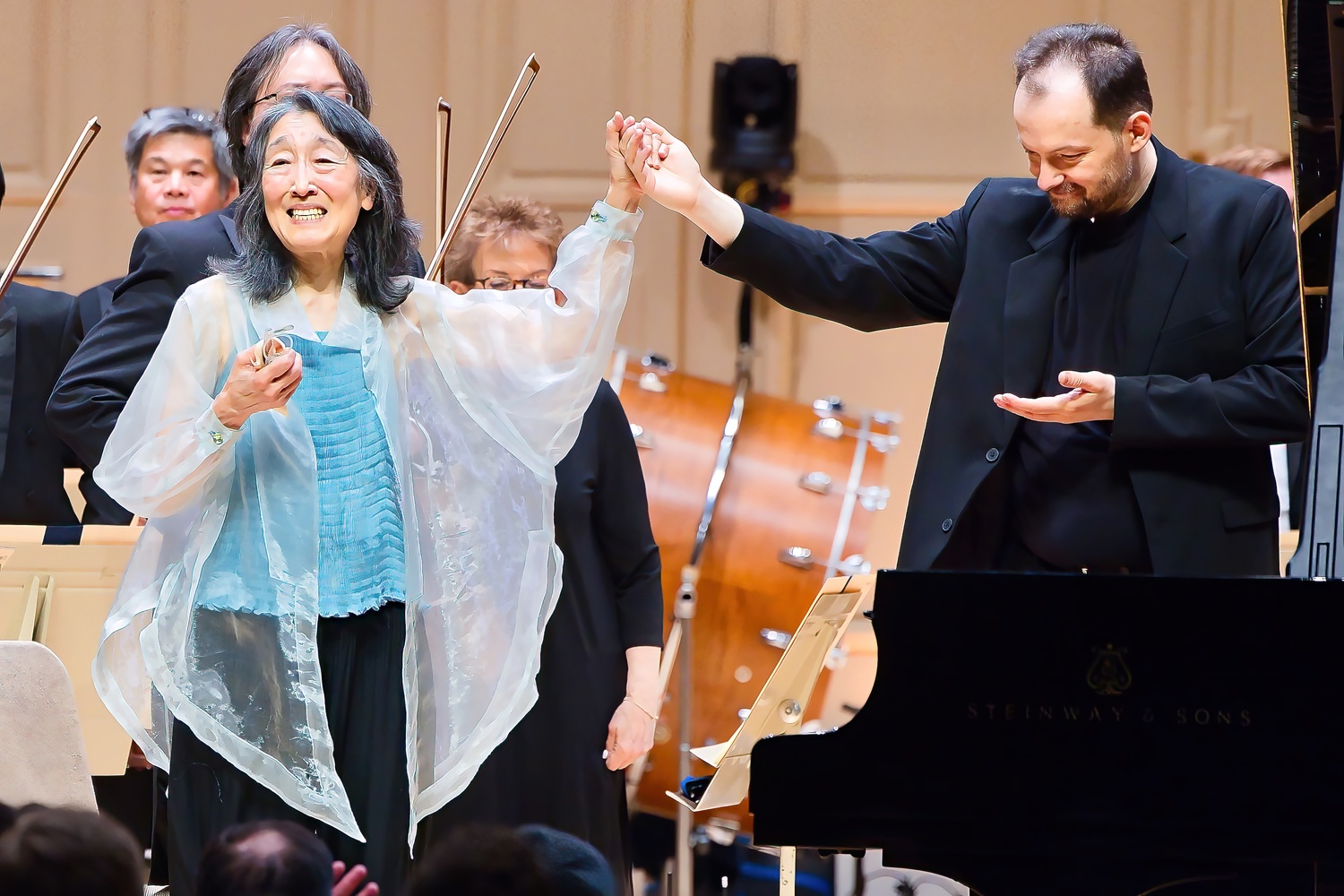
News
Summers Will Not Finish Semester of Teaching as Harvard Investigates Epstein Ties

News
Harvard College Students Report Favoring Divestment from Israel in HUA Survey

News
‘He Should Resign’: Harvard Undergrads Take Hard Line Against Summers Over Epstein Scandal

News
Harvard To Launch New Investigation Into Epstein’s Ties to Summers, Other University Affiliates

News
Harvard Students To Vote on Divestment From Israel in Inaugural HUA Election Survey
From Beethoven’s Lyrical Depth to Shostakovich’s Dark Irony: The Illuminating Music of Mitsuko Uchida and BSO

Japanese-English classical pianist Mitsuko Uchida, conductor Andris Nelsons, and the Boston Symphony Orchestra offered the audience an evening of striking contrasts on April 19, weaving together Beethoven’s crystalline lyricism with Shostakovich’s sardonic modernism in a program that felt both timeless and daring.
Opening with Beethoven’s Fourth Piano Concerto in G major, Op.58, Uchida immediately set a contemplative tone with her playing. The concert began almost as a whisper: A few quiet, inward-facing notes from the piano were answered slowly by the strings. Uchida’s playing was never forceful, but always clear and fluent, emphasizing the music’s delicate structure over theatrical display. Her attention to the piano’s texture and color through careful pedalling, soft high notes, and fluid movement across the keyboard invited listeners into a deeply lyrical world.
Rather than dazzling showmanship, Uchida’s artistry shone through her quiet confidence. The first movement created a translucent layering of sound. Her execution of wide crossover runs, delicate trills, and crisp high notes was poised and crystalline. She maintained a fine balance with the orchestra, and her tender playing shone through clearly. The contrast between the piano’s agile articulation and the warmth of strings added vibrancy to the performance.
In the second movement, the orchestra entered with a foreboding weight as if in a race with the soloist. The piano, unhurried and reflective, emerged gently, as if responding from a distant emotional realm. Uchida’s touch was thoughtful, evoking a Romantic spirit while remaining grounded in the Classical form. The tension created by the orchestra found its foil in the piano’s clear and measured voice — a conversation between anxiety and consolation. The movement's depth culminated in subtle but expressive glissandi and beautifully rendered resonances that lingered delicately in the hall.
The second movement flowed directly into the third movement, “Rondo: Vivace,” which burst forth with lively and playful musical duels between the piano and orchestra, engaging in a spirited dialogue. Uchida matched the orchestra’s fire with quicksilver responsiveness, never losing the introspective tone she had established earlier. This dynamic dialogue ended in a finale that sparkled with exuberance and vitality.
The second half of the program plunged into a different sonic universe with Shostakovich’s Symphony No. 15. From its eerie, sardonic opening — complete with comical quotes from Rossini’s “William Tell Overture” — Nelson steered the orchestra through a soundscape that was ironic as it was abstract. The use of percussion — cymbals, tom-tom, celesta, and slapstick — was a daring play of timbres that felt at once whimsical and avant-garde at Shostakovich’s time.
Particularly memorable were the solo moments. Concertmaster Nathan Cole’s violin solo shimmered with fragility, while principle cellist Blaise Déjardin’s passage in the second movement stood out as the emotional core of the piece. His sorrowful counterpoint, rich in nuance and dynamic shading, was haunting and deeply moving — a mournful reflection amid the symphony’s fragmented landscapes.
The finale returned to a dark stream of consciousness, filled with quotations from the “fate” motif of Wagner’s “Götterdämmerung” and “Tristan und Isolde.” Déjardin once again shone in a subtle lyrical exchange with the violas that underscored the depth of Shostakovich’s musical language. As the movement progressed, the orchestra navigated a deft balance of legato and staccato, culminating in a shimmering celesta passage and a final, suspended silence — frozen and unresolved.
If Uchida’s Beethoven offered a glimpse into the soul through quiet introspection, then Nelsons’ Shostakovich challenged the audience to confront ambiguity, irony and complexity. Together, they created a concert that was not only diverse in mood and form, but also covered in their commitment to sonic exploration and innovation at their respective historical time period. It was an evening of music that lingered — both in the mind and in the heart.
—Staff writer Dailan Xu can be reached at dailan.xu@thecrimson.com. Follow her on X @Dailansusie.
Want to keep up with breaking news? Subscribe to our email newsletter.
